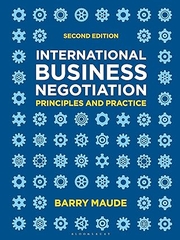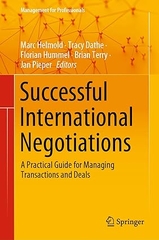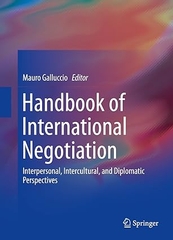-
-
-
Tổng tiền thanh toán:
-
-
Thông tin
-
Tìm sách theo yêu cầu
Since its original publication nearly thirty years ago, Getting to Yes has helped millions of people learn a better way to negotiate. One of the primary business texts of the modern era, it is based on the work of the Harvard Negotiation Project, a group that deals with all levels of negotiation and conflict resolution.
Getting to Yes offers a proven, step-by-step strategy for coming to mutually acceptable agreements in every sort of conflict. Thoroughly updated and revised, it offers readers a straight-forward, universally applicable method for negotiating personal and professional disputes without getting angry-or getting taken.
- Link: http://www.amazon.com/Getting-Yes-Negotiating-Agreement-Without/dp/0143118757
Getting to Yes offers a proven, step-by-step strategy for coming to mutually acceptable agreements in every sort of conflict. Thoroughly updated and revised, it offers readers a straight-forward, universally applicable method for negotiating personal and professional disputes without getting angry-or getting taken.
Product Details
Paperback: 240 pages
- Publisher: Penguin Books; Revised edition (May 3, 2011)
- Language: English
- ISBN-10: 0143118757
- ISBN-13: 978-0143118756
- Product Dimensions: 7.7 x 5 x 0.7 inches
- Shipping Weight: 6.4 ounces (View shipping rates and policies)
- Average Customer Review: 4.5 out of 5 stars See all reviews (184 customer reviews)
- Amazon Best Sellers Rank: #510 in Books (See Top 100 in Books)
- #2 in Books > Business & Money > Management & Leadership > Negotiating
- #4 in Books > Business & Money > Job Hunting & Careers > Guides
- #10 in Books > Business & Money > Business Life > Motivation & Self-Improvement
Editorial Reviews
About the Author
Roger Fisher is the Samuel Williston Professor of Law Emeritus and director emeritus of the Harvard Negotiation Project.
William Ury cofounded the Harvard Negotiation Project and is the award-winning author of several books on negotiation.
Bruce Patton is cofounder and Distinguished Fellow of the Harvard Negotiation Project and the author of Difficult Conversations, a New York Times bestseller.
William Ury cofounded the Harvard Negotiation Project and is the award-winning author of several books on negotiation.
Bruce Patton is cofounder and Distinguished Fellow of the Harvard Negotiation Project and the author of Difficult Conversations, a New York Times bestseller.
Most Helpful Customer Reviews
61 of 62 people found the following review helpfulBy Lisa Shea HALL OF FAMETOP 500 REVIEWERVINE VOICE on July 2, 2012
Format: Paperback Verified Purchase
Comment Was this review helpful to you? YesNoThe title of Fisher and Ury's book is Getting to Yes - Negotiating Agreement without Giving In. It's a case where the title clearly lays out what the book is about. In Getting to Yes the authors present, step by step, how to find your way to a win-win solution that helps meet your goals while at the same time preserving the relationship so that future negotiations also go smoothly.
This book was the assigned textbook for a college course I took on negotiation, but it's one of those fairly rare cases where the material that's useful for a college course is also immensely useful for off-the-street people in a variety of situations. This book avoids complicated jargon and long, droning background chapters. Instead, it plunges into helpful information to assist people in negotiating for a new car, negotiating issues with their landlords, and all the many ways we all negotiate for our position throughout life.
Negotiation isn't just for union leaders trying to avert a strike. All of us negotiate each day as we try to juggle our many roles. We negotiate with our co-workers over assignments. We negotiate with our family members over chores. In an ideal world all of those discussions would go quickly, smoothly, and with as little strife as possible.
Getting to Yes provided numerous helpful examples which made their points more easy to understand. It is so true that people tend to remember stories where they might not remember dry text. When I think about this book I do remember several of the stories clearly, and those help to represent the points the authors were making. The stories help remind me to focus on the issues when negotiating and to look for objective standards to work with.
The information presented is wonderful, and immediately useful in life.
On the down side, this is a new version of older material. The authors chose to keep the initial book in its original form and then add on additional information at the end. I appreciate for historical reasons why they wanted to do that. However, from a fresh reader point of view, I feel they should present an integrated whole which most clearly presents the full information. The way the book is laid out currently, you have to go back and forth to find all information on a given topic.
Also, the format is not laid out for easy reference. If they went more for a "dummies" style with an easy to scan layout, graphs and charts to quickly find and scan, and quick end-summaries, that would make this more useful as a reference book to keep on a shelf. Right now if I had an issue to handle it would be less than quick to grab the book and find the answer. I would have to wade through the book to figure out where to get the support I needed.
Still, I do recommend that everyone read this book at least once, to build their skills in negotiation. It's something we all have to do!
This book was the assigned textbook for a college course I took on negotiation, but it's one of those fairly rare cases where the material that's useful for a college course is also immensely useful for off-the-street people in a variety of situations. This book avoids complicated jargon and long, droning background chapters. Instead, it plunges into helpful information to assist people in negotiating for a new car, negotiating issues with their landlords, and all the many ways we all negotiate for our position throughout life.
Negotiation isn't just for union leaders trying to avert a strike. All of us negotiate each day as we try to juggle our many roles. We negotiate with our co-workers over assignments. We negotiate with our family members over chores. In an ideal world all of those discussions would go quickly, smoothly, and with as little strife as possible.
Getting to Yes provided numerous helpful examples which made their points more easy to understand. It is so true that people tend to remember stories where they might not remember dry text. When I think about this book I do remember several of the stories clearly, and those help to represent the points the authors were making. The stories help remind me to focus on the issues when negotiating and to look for objective standards to work with.
The information presented is wonderful, and immediately useful in life.
On the down side, this is a new version of older material. The authors chose to keep the initial book in its original form and then add on additional information at the end. I appreciate for historical reasons why they wanted to do that. However, from a fresh reader point of view, I feel they should present an integrated whole which most clearly presents the full information. The way the book is laid out currently, you have to go back and forth to find all information on a given topic.
Also, the format is not laid out for easy reference. If they went more for a "dummies" style with an easy to scan layout, graphs and charts to quickly find and scan, and quick end-summaries, that would make this more useful as a reference book to keep on a shelf. Right now if I had an issue to handle it would be less than quick to grab the book and find the answer. I would have to wade through the book to figure out where to get the support I needed.
Still, I do recommend that everyone read this book at least once, to build their skills in negotiation. It's something we all have to do!
19 of 19 people found the following review helpfulBy Allan M. Lees on September 23, 2012
Format: Paperback
Comment Was this review helpful to you? YesNoThere are a few books that have such relevance to so many aspects of daily life that they should be on everyone's "must read" list, and this is one of them. Although at first it might seem that this is merely one more addition to the seemingly endless pile of platitudinous self-help books that crowd the bookshelves and deliver little or no real worth, in fact this book is a highly pragmatic text on the process of negotiation. The authors don't pretend that negotiating will get you everything you want - in fact they are very clear on the limitations of negotiation and how to think of negotiation as a process that has strict boundaries. What the book does is make explicit the nature of negotiation, the types of tactics people commonly use, and the most competent method for pursuing negotiations so as to maximize the possibility of achieving a negotiated outcome both parties can live with. The text is clear, the examples simple to grasp, and the conceptual framework adequately developed. Nowadays we might add some learning that evolutionary psychology has provided, but aside from that this is a superb book that can enable enhanced outcomes in most realms of life, from family conflicts through business negotiations to community issues. The entire book can be read and absorbed in less than two hours, but the lessons can be applied over a lifetime.
13 of 13 people found the following review helpfulBy Houman Tamaddon on October 7, 2011
Format: Paperback
After reading Roger Dawson's "Secrets of Power Negotiating" (another outstanding book, by the way), I did not expect to learn much new material from this book. I was wrong - "Getting to Yes" offers a new approach to negotiating. As the authors point out, we negotiate constantly in our daily lives. Most of us are unaware of the times we negotiate with our friends, coworkers, and family. What this book teaches readers is to how to go about resolving conflicts in an unemotional and logical way. Much of the advice here is given in the context of negotiating, but interestingly it could have easily been positioned as a book on influence. The material here reminded me of Dale Carnegies' "How to Win Friends and Influence People" (also a brilliant book).
I don't think that people should just read this book to get an advantage in negotiating. In fact, all sides would probably be mutually better off if they read this book. It advances civil society by promoting talk over violence and anger. I wonder why these books are not required reading for high school students. I certainly wish I had come across them when I was younger.
I don't think that people should just read this book to get an advantage in negotiating. In fact, all sides would probably be mutually better off if they read this book. It advances civil society by promoting talk over violence and anger. I wonder why these books are not required reading for high school students. I certainly wish I had come across them when I was younger.
XEM CHI TIẾT TẠI AMAZON.COM
- Thông tin chi tiết
- Mục lục
- Đánh giá & bình luận của người mua
- Những cuốn sách cùng chủ đề hoặc có liên quan
Tại web chỉ có một phần nhỏ các đầu sách đang có nên nếu cần tìm sách gì các bạn có thể liên hệ trực tiếp với Thư viện qua Mail, Zalo, Fanpage nhé
Đăng ký nhận tin qua email
Hãy đăng ký ngay hôm nay để nhận được những tin tức cập nhật mới nhất về sản phẩm và các chương trình giảm giá, khuyến mại của chúng tôi.












